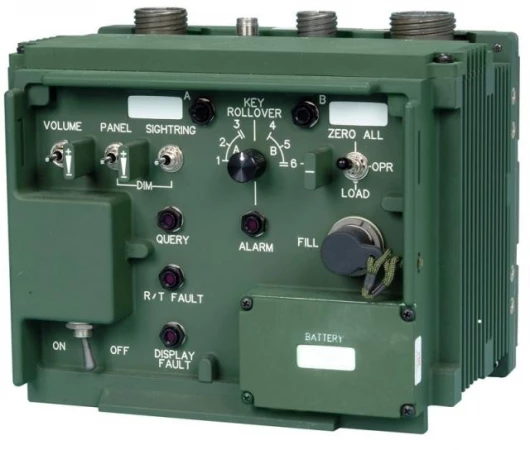November 1, 2005 Fratricide is the military term for getting killed by your own side. As dreadful as it may sound, it happens in every conflict and one of the key objective in the digitalisation of the battlefield is to eliminate the self-inflicted carnage. Raytheon (RSL) is currenty trialling two Battlefield Target Identification Device (BTID) Transponders at the Coalition Combat Identification Advanced Concept Technology Demonstrator (ACTD) trials being undertaken on Salisbury Plain which are intended to do just that. RSL was contracted by the UK Ministry of Defence (MoD) in July this year to provide the systems and also to provide vehicle integration and associated technical support during the trials. The Raytheon equipment will be fielded on UK, US and Italian combat vehicles.
Raytheon has been setting standards in Combat ID since 1970 and more recently assisted the technical development of STANAG 4579. Its BTID system is designed to be fully interoperable with not only NATO systems but also with those of key allies worldwide.
Raytheon BTID equipment has been extensively de-risked and trialled outside of Urgent Quest on a series of US Army and other international demonstrations. It significantly decreases the risk of fratricide as well as reducing the time to kill targets. Armoured vehicle crews have found Raytheon's BTID to be a highly effective aid to decision making, enabling them to prosecute missions far more quickly and with greater certainty than before.
BTID is a cooperative system where transponder equipped friendly vehicles are queried by interrogator equipped combat vehicles as part of their target acquisition process to provide positive identification of friendly forces.
The ACTD trials are being undertaken to demonstrate the military utility of cooperative combat identification system technologies. BTID employs millimetre wave technology and is one of the combat ID technologies to be evaluated at the trials. BTID provides a force multiplier and is a 'duty of care' device that increases combat effectiveness. Additionally it provides a self-contained secure networking capability to support small unit blue force tracking applications providing soldiers with improved battlefield situational awareness without demanding additional scarce bandwidth from primary communications systems.
Participating nations involved in the trials include the UK, Australia, Canada, Denmark, France, Germany, Italy, Sweden and the United States. RSL, the UK-based subsidiary of Raytheon Company, employs over 1500 people. The company is a prime contractor and major supplier to the UK Ministry of Defence and is involved in numerous, high priority programmes for the US Department of Defense. RSL designs, develops and manufactures a range of high technology defence and commercial electronics.





